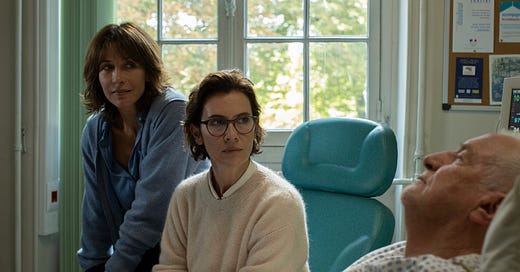Everything Went Fine
Sophie Marceau and André Dussollier combine for a vivid portrait of a daughter and father struggling with his desire to be assisted in suicide after suffering a debilitating stroke.
They say the worst loss a person can experience is a parent whose child dies before they do. While thankfully relatively rare, almost everyone over a certain age knows what it’s like to lose a parent. In some ways it’s the final step into full adulthood, where the elder figure has gone and you assume the role of matriarch or patriarch of your clan.
French writer Emmanuèle Bernheim experienced this with her father, André, with the added stressor that he was determined to end his own life after a stroke left him debilitated — and demanded that his daughters assist him in suicide.
She later turned this saga into a book that has been made into a movie, “Everything Went Fine,” adapted and directed by François Ozon (“Swimming Pool,” “Summer of 85”) starring Sophie Marceau and André Dussollier as daughter and father. It’s a very emotional drama and also a close character study of two very different people who happen to be related.
Emmanuèle and her sister, Pascale (Géraldine Pailhas), are both middle-aged, married and successful, with Pascale also having children. The story starts with André already fallen ill to stroke, which is critical because we never see what he was like beforehand.
At first, he can barely talk and is bedridden, with his right arm rendered immobile. He Slowly recovers to the point the doctors feel he’s out of danger, but he has the familiar drooping of the eye and mouth on one side of his face and dignity-sapping infirmities — incontinence, spitting up, having to be bathed and shaved, etc.
Just when Emmanuèle thinks he is well on the road to recovery, her father turns to her and says, “I want you to help me end it.” She is disturbed but initially dismisses it as passing depression — something the doctors and therapists say is common. But his pleas turn into a constant refrain of insistence, and the sisters begin to explore the options of assisted suicide.
Doing so in France would render family and physicians criminally culpable, so a plan forms to take André to Switzerland with the cooperation of a group dedicated to dying with dignity.
Complications intrude: their mother, Claude (Charlotte Rampling), is infirm herself with a disease similar to Parkinson’s and creeping dementia. Her marriage with André was one of convenience: he is gay, but well-to-do and able to support her career as a sculptor, and they shared a mutual desire for children.
Claude accepted the bargain but now finds the returns have diminished, leaving her without any sense of joy in life. At one point André describes her as already dead — not out of cruelty, but blurting out the stark truth, as is his wont.
He also has a bad habit of telling virtually everyone he meets about his plans to kill himself, which raises the concerns of the authorities and the nursing home where André comes to live. What once was a complicated and emotionally draining process for the daughters becomes a literal game of cloak-and-dagger.
A belligerent fellow named Gérard (Grégory Gadebois) turns up, demanding to see André and receive things he he says were promised, including money and an expensive watch. Emmanuèle and Pascale are quite familiar with this shabby figure, privately referring to him as “Mr. Sh*thead.” He has a long association with their father that the old man has finally come to recognize is abusive.
Emmanuèle’s lone beacon of support is her husband, Serge (Éric Caravaca), a bookish type who gets shunted to the background except when needed.
As André continues to grow stronger, we find out more and more about him as a father and a person, assisted by Emmanuèle’s flashbacks to incidents when she was a child that reveal he was not the most loving parent. But, not unlike her mother, she can’t help adoring him.
As the date for his trip to Switzerland approaches, André grows to seem more full of life than ever. He takes visits from old friends, laughs constantly, and insists upon a visit to his favorite restaurant. Surely, Emmanuèle thinks (and silently hopes), this is not the portrait of a man desperate to die?
Ozon brings a sensitive guiding hand to the story, and by the end we feel almost part of the family, we know these two people so well.
Early on, she saves a salmon-and-cream-cheese sandwich her father took a single bite out of, ostensibly to finish it, but then shuffles it into the freezer as if she cannot bear to see it thrown out.
Emmanuèle takes to using her fingers to force down her eyelid and mouth to make herself resemble her father’s current state. Eventually, this even becomes a little in-joke between them — morbid, and yet somehow intimate.
Love is strange thing, and never stranger than we’re in danger of seeing the object of our affection depart. “Everything Went Fine” is a prickly but lovely paean about saying goodbye.





